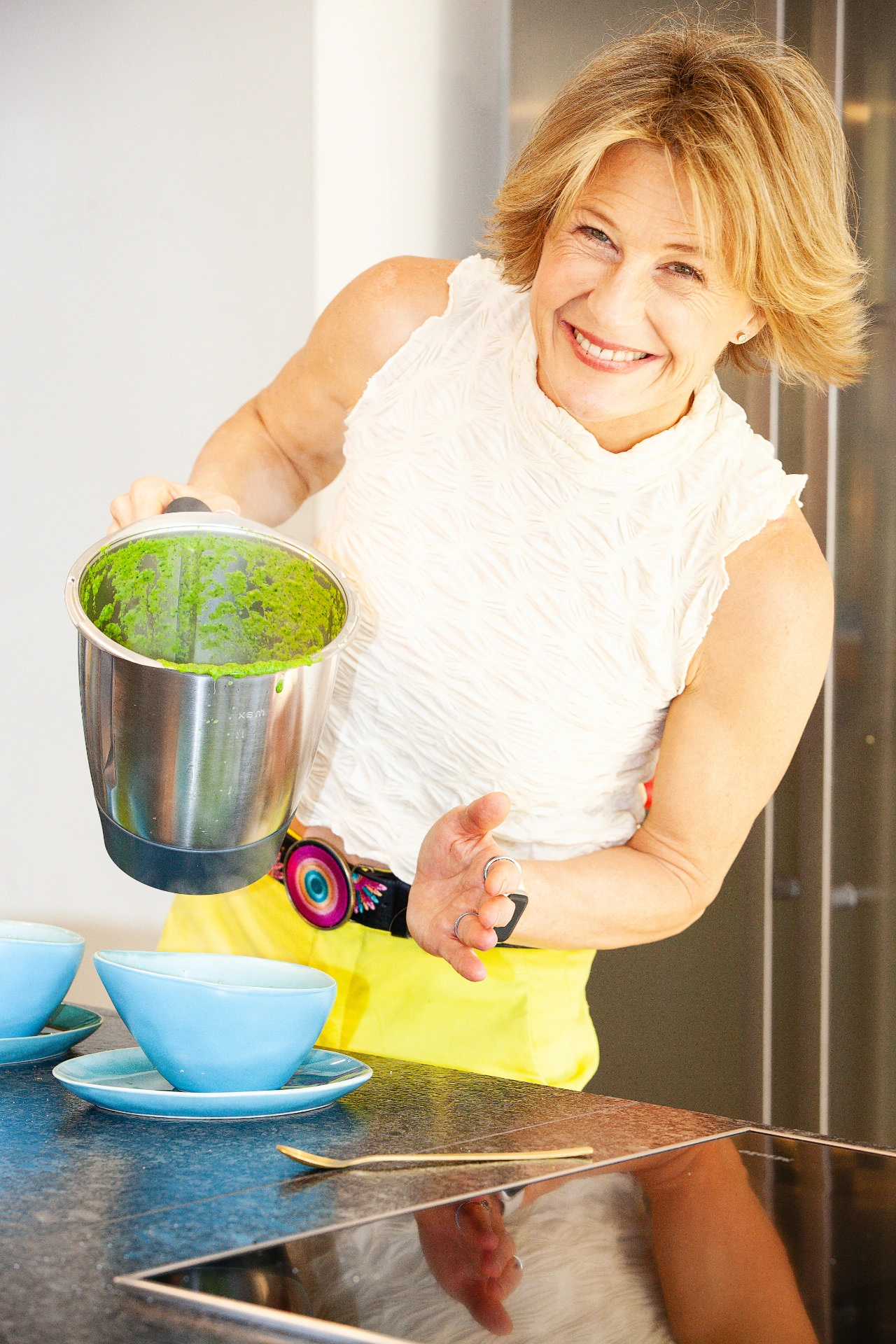
Cholesterol is a type of fat or lipid. This waxy substance is made by our liver but is also found in some foods, such as eggs, animal fats and cheese. Because fats are insoluble in the blood we need lipoproteins, such as LDL and HDL to transport cholesterol, a bit like taxis!
We are advised to keep our daily cholesterol levels below 300mg daily. To put this into perspective, an egg, for example contains around 185mg cholesterol per egg and hard cheese around 100mg/100g.
We do not actually ‘need’ cholesterol because most of the cholesterol in our body is made by the liver itself. This is why people following a plant-based diet still make cholesterol even though they may not consume any in their diet.
Cholesterol is essential to our health! This is because it is essential for the formation of all our cell membranes, a number of hormones including oestrogen, cortisol, and testosterone and also vitamin D!
Are there any symptoms of high cholesterol?
Most people are completely unaware that they have elevated cholesterol levels, and this is normally discovered at a routine blood test. This means that it can be a ‘silent’ condition, which is why routine screening is important.
There are, however, groups of people who are at increased risk for high cholesterol levels, such as those who are overweight / obese with excess trunk or visceral fat levels, those who smoke, those who are sedentary or those who consume a poor diet rich in processed or ultra processed foods, low in vegetables and fibre and high in refined carbohydrates and sugars. In addition, there is an increased risk of high cholesterol in those with pre-existing health conditions such as heart disease, diabetes, high blood pressure, hypothyroidism, or kidney disease.
High cholesterol and high blood pressure
These two conditions are linked. If high cholesterol is accompanied by arterial plaques (or hardening of the arteries from cholesterol and calcium deposits), the arteries can then become narrower, which can lead to an increase in blood pressure. This is a little like squashing the end of a water hose to reduce the diameter and the water pressure increasing as a result.
Familial hypercholesterolaemia is a genetic condition that can lead to elevated cholesterol levels. This genetic condition can be passed down from one person to the next by one or more defective genes. These genes can impede the excretion of excess LDL cholesterol often known as the ‘bad’ cholesterol. This condition is not as common as we think and, according to the British Heart Foundation, affects only around 1 in 250 people, making diet and lifestyle the most likely culprit. This means around 270,000 people in the UK may have this condition, many being unaware that they have it.
The risk factors
Science is gradually showing us that cholesterol is not as simple as we once thought. It is not necessarily the cholesterol per se itself that is a problem, but when the cholesterol becomes oxidised or damaged in the bloodstream it becomes more dangerous to our health. It is this oxidised cholesterol that can build up in the artery walls leading to plaque build-up. Lifestyle factors such as exercise, our diet, our weight or smoking can all affect this chemical reaction in our body.
General medicine has shown therefore that elevated cholesterol is a risk factor to heart attacks and strokes, high blood pressure, angina and also kidney disease.
It is often the overlap of multiple conditions, such as obesity and Type 2 diabetes that increase our risk further.
Cholesterol testing
Cholesterol is normally tested at most routine blood tests. These tests look at total cholesterol as well as LDL known as bad cholesterol (low density lipoproteins) and HDL (high density lipoproteins) also known as ‘good’ cholesterol. Think of LDL as the delivery vans, bringing cholesterol to our tissues and HDL as the dumper trucks taking it back to the liver for excretion. Some tests also show VLDL(very low-density lipoproteins), which are thought to be the worst for our health.
Some labs now offer home test kits which use a blood spot rather than a blood draw with a nurse.
Most medical professionals like total cholesterol (that is the combination of LDL, HDL and VLDL) to be BELOW 5mmol/L
Cholesterol levels between 5-6.8 would be considered elevated and above this HIGH
LDL should usually fall <3 mmol/L
HDL should be >1.0 mmol/L for men and 1.2mmol/L for women.
Normally the amount of LDL to HDL is taken into consideration when looking at total cholesterol. If a person as slightly elevated cholesterol, but the amount of HDL is high and the amount of LDL low, they may be considered as having a lower risk than someone with LOW HDL and high LDL.
Understanding diet and cholesterol
For many years people were told to eat low fat foods and to avoid higher cholesterol foods! While we don’t want to be eating animal fats or fried foods every day, some natural foods that contain cholesterol, such as eggs eaten in moderation, have not been shown to influence most peoples cholesterol negatively. I still have clients who are afraid to eat prawns because they contain some cholesterol!
From working in clinic for almost 20 years, I have found that when we eat foods in their natural state, and by that I mean eating more simply and cooking from scratch, cholesterol seems to be less of a problem.
Lowering the fat content in food products, simply led to our foods becoming more processed. Lowering fats in the diet leads to lower satiety and can also make us eat more carbohydrates in the diet to make up the shortfall in calories. We now know that high sugar and refined carbohydrate diets can also lead to an increase in overall cholesterol!
We need to look at the diet in its entirety and not just focus in on one food group as we eat a diverse range of foods, and it is the interaction between all of the foods we eat that leads to this problem.
I think the worst foods we can eat are ultra-processed foods. These foods have been shown to contribute to over 50% of the energy intake (calories) for a UK adult and over 80% of energy in teenagers.
These foods decorate what I call the rainbow aisles in the supermarket as well as masquerading as real food. This means they find their way easily into our trollies and in particular when we need a quick snack.
I recommend always going back to basics.
For main meals:
- Fill half of your plate with vegetables (for adults this is around 250g per main meal)
- Add ¼ plate of lean protein, such as fish, shellfish, oily fish, poultry, lean meat, beans, lentils, eggs, soft cheeses, tofu, nuts or seeds.
- Add no more than ¼ plate wholefood carbohydrates such as sourdough bread, quinoa, sweet potato, new potatoes brown rice etc.
- Add healthy heart friendly fats such as avocados or olive oil dressing.
Best FOODS – Mediterranean diet all the way. This is a colourful diet rich in vegetables with lean proteins. Often animal proteins are mixed with beans and pulses to make them go further. But most importantly the Mediterranean diet uses OLIVE OIL.
Extra virgin olive oil is excellent for our heart health as it contains plenty of polyphenols which are the bitter, green compounds. These polyphenols are powerful antioxidants that are cardioprotective. I tell all my clients to ditch their vegetables oils (sunflower, rapeseed etc) as well as highly processed spreadable margarines and just buy extra virgin olive oil instead.
Eat the most colourful versions of fruits and vegetables that you can! Blueberries, purple carrots, red onions, dark green kale, red peppers etc. as these contain more of the protective plant compounds or phytonutrients.
Certain foods contains soluble fibres such as chia seeds, flaxseeds, beans, lentils and oats. These can help to escort old cholesterol from the bowels for excretion.
Do lifestyle factors impact cholesterol levels?
Absolutely. Feeling under stress or pressure can increase our cholesterol levels. This is a direct response to the release of cortisol and adrenalin in the body. These are our flight or fight hormones.
Exercise has been shown to lower total cholesterol as it may lower stress and also helps us to increase our HDL cholesterol and lower our HDL.
Treatment for high cholesterol
I feel like this is still early days, but certain probiotics are being investigated for their role in modulating our cholesterol levels. Currently Lactobacillus Plantarum and Lactobacillus reuterii are probably the best researched. Understanding the link between the microbiome and cholesterol levels is a huge breakthrough.
I always look at diet and lifestyle factors first as these are often the easiest to change. When a client comes to me with elevated cholesterol, I usually start by cleaning up their overall diet and implement moderate intermittent fasting (14 hour fasts at night). I also reduce snacking considerably or completely if my clients are overweight. This alone can often influence LDL cholesterol levels.
Next, I look at removing sugars, refined grains and processed foods from the diet and increasing natural foods, plants and fibre (I have my clients eat 30g+ fibre each day).
I always work with food positivity, we don’t count calories, we count nutrients. We focus on fibre, lean proteins and vegetables and not on the foods we are leaving out. This is so important for people as they should never feel like they are being deprived.
Of course, sometimes medications are necessary and I fully support this, but also use diet to try and keep statin doses as low as possible for my clients.
About the Author, Dominique Ludwig, Nutritionist MSc and Nutritional Therapist mBANT
Dominique Ludwig is an accomplished Nutritionist MSc., and Nutritional Therapist who is also BANT, CNHC and AFMCP accredited. Dominique works in numerous health conditions using a personalised nutrition approach.She specialises in her signature group programmes Renew Reset Recharge® programme and The Triple 30 Plan and runs a busy clinic in the heart of the South Downs where she works with her private clients as a Nutritional Therapy Practitioner, offering personalised Renew Reset Recharge® appointments.Dominique is also a double award-winning nutritionist. Dominique has over 30 years’ experience as a King’s College, London qualified Nutritionist and almost 20 years as a registered Nutritional Therapist.
Dominique works with many high-profile and A-list clients, known and respected for her discretion, expertise, and trustworthiness. Dominique works out of her own busy practice, Dominique Ludwig Nutrition Limited, in Hampshire as well as Meyer Clinic in Chichester. Dominique has helped over a thousand clients, globally, live healthier lives. She is a regular contributor to The Times, The Sunday Times and Times 2, Sheerluxe, Top Sante and many other magazines and podcasts.
DISCLAIMER:
Features published by Dominique Ludwig are not intended to treat, diagnose, cure or prevent any disease. Always seek the advice of your GP or another qualified healthcare provider for any questions you have regarding a medical condition, and before undertaking any diet, exercise or other health-related programme. Please refer to our Terms and Conditions and Medical Disclaimer for more information as well as our Webiste Terms and Conditions.





